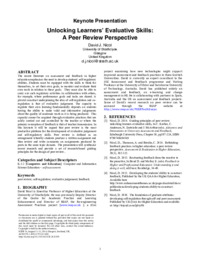Unlocking learners' evaluative skillsa peer review perspective
David J. Nicol
Publikationsdatum:
Zu finden in: ICER 2014 (Seite 1 bis 2), 2014
|
 |
 Diese Seite wurde seit 5 Jahren inhaltlich nicht mehr aktualisiert.
Unter Umständen ist sie nicht mehr aktuell.
Diese Seite wurde seit 5 Jahren inhaltlich nicht mehr aktualisiert.
Unter Umständen ist sie nicht mehr aktuell.
 Zusammenfassungen
Zusammenfassungen
The recent literature on assessment and feedback in higher education emphasises the need to develop students' self-regulatory abilities. Students must be equipped with the skills to think for themselves, to set their own goals, to monitor and evaluate their own work in relation to these goals. They must also be able to carry out such regulatory activities in collaboration with others, for example, where performance goals and tasks are shared. A pivotal construct underpinning the idea of self-regulation and co-regulation is that of evaluative judgement. The capacity to regulate their own learning fundamentally depends on students having the ability to make valid and informative judgements about the quality of academic work as it is being produced. This capacity cannot be acquired through evaluative practices that are solely carried out and controlled by the teacher or where the primary conception of feedback is that of teacher transmission. In this keynote it will be argued that peer review is the most productive platform for the development of evaluative judgement and self-regulatory skills. Peer review is defined as an arrangement whereby students produce a written assignment and then review and write comments on assignments produced by peers in the same topic domain. The presentation will synthesise recent research and provide a set of research-based guiding principles for the design of peer review.
 Dieses Konferenz-Paper erwähnt ...
Dieses Konferenz-Paper erwähnt ...
 Anderswo finden
Anderswo finden
 Volltext dieses Dokuments
Volltext dieses Dokuments
 |  Unlocking learners' evaluative skills: Fulltext at the ACM Digital Library ( Unlocking learners' evaluative skills: Fulltext at the ACM Digital Library ( : :  , 422 kByte; , 422 kByte;  : :  Link unterbrochen? Letzte Überprüfung: 2020-11-28 Letzte erfolgreiche Überprüfung: 2020-04-28) Link unterbrochen? Letzte Überprüfung: 2020-11-28 Letzte erfolgreiche Überprüfung: 2020-04-28) |
 Anderswo suchen
Anderswo suchen 
 Beat und dieses Konferenz-Paper
Beat und dieses Konferenz-Paper
Beat hat Dieses Konferenz-Paper während seiner Zeit am Institut für Medien und Schule (IMS) ins Biblionetz aufgenommen. Beat besitzt kein physisches, aber ein digitales Exemplar. Eine digitale Version ist auf dem Internet verfügbar (s.o.). Aufgrund der wenigen Einträge im Biblionetz scheint er es nicht wirklich gelesen zu haben. Es gibt bisher auch nur wenige Objekte im Biblionetz, die dieses Werk zitieren.











 Biblionetz-History
Biblionetz-History